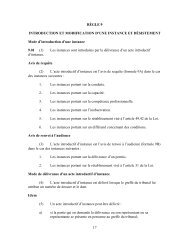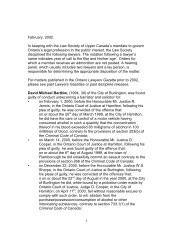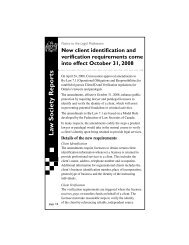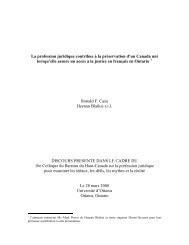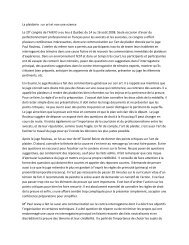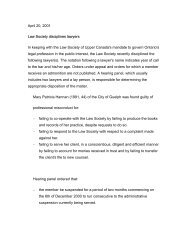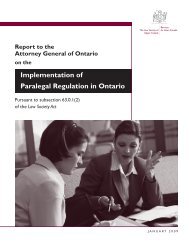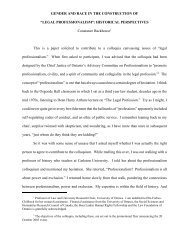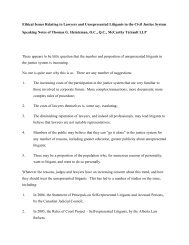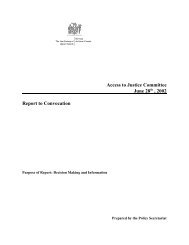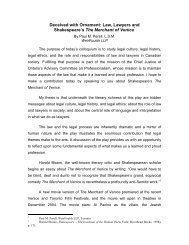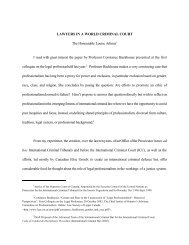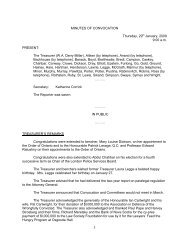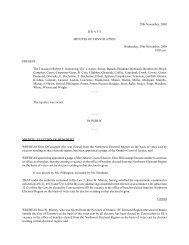of self regulation? - The Law Society of Upper Canada
of self regulation? - The Law Society of Upper Canada
of self regulation? - The Law Society of Upper Canada
You also want an ePaper? Increase the reach of your titles
YUMPU automatically turns print PDFs into web optimized ePapers that Google loves.
dishonesty rather than merely excessive billing. 70 This seems to be a fairly low hurdle to<br />
clear, too, since both Hutchinson and Gavin Mackenzie note that virtually no one is<br />
disciplined for charging unreasonable or excessive fees. 71<br />
Every client has the option to have their bill taxed, or reviewed by a court <strong>of</strong>ficial<br />
for fairness. It should be noted that this is one <strong>of</strong> the examples <strong>of</strong> judicial involvement in<br />
the <strong>regulation</strong> <strong>of</strong> the pr<strong>of</strong>ession. Moreover bills which are taxed are overwhelmingly<br />
reduced. 72 It is disconcerting that the most effective method <strong>of</strong> regulating legal fees is the<br />
one which removes control from the hands <strong>of</strong> the pr<strong>of</strong>ession. If consumers can be<br />
guaranteed fair billing only through recourse to the courts, that would seem to be a<br />
significant institutional failure <strong>of</strong> <strong>self</strong>-<strong>regulation</strong>.<br />
9. Self Represented Litigants in Court<br />
Closely related to the problem <strong>of</strong> rising legal fees and declining access to justice<br />
is the increasing number <strong>of</strong> <strong>self</strong>-represented litigants in court. While lawyers’ fees are<br />
rising, funding for legal aid programs has not always kept pace. This disparity means that<br />
a growing number <strong>of</strong> litigants both fail to meet the threshold income to qualify for legal<br />
aid and yet cannot practically afford a private lawyer. As many commentators have<br />
noted, attempting to represent one<strong>self</strong> in court is at best difficult, and in many cases<br />
seems virtually hopeless. 73 While governmental and other public initiatives can be<br />
70 Ibid at 82.<br />
71 Hutchinson, supra note 66; Gavin MacKenzie, <strong>Law</strong>yers and Ethics: Pr<strong>of</strong>essional Responsibility and<br />
Discipline (Toronto: Carswell, 2006) at 25.5a. Hutchinson notes that the discipline process is usually only<br />
engaged “where there is evidence that the lawyer has actually cheated or duped the client” (at 82).<br />
72 See Woolley, “Time for Change,” supra note 55 at 886.<br />
73 <strong>The</strong> old legal adage that “he who represents him<strong>self</strong> has a fool for a client and an idiot for a lawyer”<br />
seems cruel in light <strong>of</strong> the increasing numbers <strong>of</strong> less-than-willing <strong>self</strong>-represented litigants in the court<br />
rooms. Putting the point somewhat more gently, Chief Justice McLachlin stated “many Canadian men and<br />
women find themselves unable, mainly for financial reasons, to access the Canadian justice system. Some<br />
20



